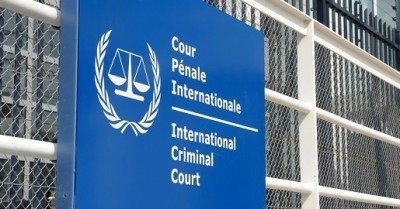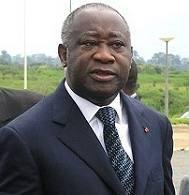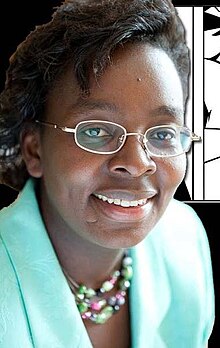Burundi Defies the Imperial Criminal Court, An Interview with John Philpot

The International Criminal Court (ICC) propagates injustice as stark as slavery or South African apartheid. It’s a Western court that prosecutes Africans exclusively. In June 2011, the ICC engaged in one of its most shocking imperial crusades by indicting Libyan President Muammar al-Gaddafi and his son Saif al-Islam Gaddafi for crimes against their own people. NATO claimed that the indictments justified destroying Libya with an aerial bombing campaign, and the ICC failed to indict a single NATO commander.
Neither Samantha Power’s histrionics about Libyans facing genocide nor the UN’s preposterous “responsibility to protect” doctrine could disguise NATO’s real goal. Gaddafi had proposed a more assertive African Union with a currency and monetary policy crafted to liberate Africa from neo-colonial economic predators, so Gaddafi had to die. Libya’s national bank and oil company died with him, as did the last of the ICC’s credibility as anything but an instrument for projecting Western imperial power.
Now, six years later, Prosecutor Fatou Bensouda has announced that she will investigate Burundian officials for crimes against humanity allegedly committed during the country’s past three years of civil unrest.
Burundi is a tiny East African nation of 11 million, the fifth poorest in the world, and it’s leaning eastward, building alliances with Russia and China. It is geostrategically situated, bordering Rwanda to the north, Tanzania to the east, and the hugely resource rich Democratic Republic of Congo to the west.
A Russian firm won the contract to exploit its nickel reserves, which are probably its most valuable resource. Officials said that the Russian firm offered better terms than its Western competitors.
In May 2015, Russia and China blocked a UN Security Council resolution to censure Burundian President Pierre Nkurunziza for seeking another term in office—his second or third, depending on one’s interpretation of the Burundian constitution. Russia’s UN Ambassador, the now deceased Vitaly Churkin, told reporters,
“It’s not the business of the Security Council and the UN Charter to get involved in constitutional matters of sovereign states.”
Five months later, on October 27, 2016, Burundi notified the ICC that it intended to withdraw from the court’s jurisdiction in accordance with the will of its Parliament. It completed the process a year later, on October 27, 2017, when it was widely reported that Burundi had become the first nation to leave the ICC. Now, however, a press release on the court’s website states that authorization for the new investigation was issued under seal on October 25, two days before Burundi’s exit, and that the government is therefore legally obliged to cooperate.
I asked John Philpot, international criminal defense attorney and co-author of the anthology “Justice Belied: The Unbalanced Scales of International Criminal Justice,” to comment.
***
John Philpot: This is just another disgraceful episode in the history of the ICC. In June 2011, the court indicted Libyan President Muammar al-Gaddafi and his son Saif al-Islam Gaddafi for war crimes and crimes against humanity to help NATO whitewash the war of aggression it was waging in Libya. That war started in early March and ended at the end of October, when President Gaddafi was murdered with the blessing of Secretary of State Hillary Clinton who said, “I want him dead,” and then cackled, “We came, we saw, he died.” Murdering a prisoner of war is a war crime, according to the Geneva Convention, but the ICC didn’t concern itself with that.

President Laurent Gbagbo (Source: Wikimedia Commons)
Several months after NATO started bombing Libya, French troops invaded Ivory Coast to support one side of an election dispute. On April 11, they arrested President Laurent Gbagbo, his wife, and a minister.
Mr. Gbagbo is a very interesting figure. He earned his doctorate from Paris Diderot University and, in the 1980s, served as Director of the Institute of History, Art, and African Archeology at the University of Abidjan. He helped found the Ivorian Popular Front, a political party, and vowed to modernize the country by building infrastructure for transportation, communication, clean water, and clean energy. Prior to the NATO war on Libya, he had been collaborating with Gaddafi on the creation of an African currency and monetary policy.
In November 2011, he was transferred to the ICC where his trial for alleged crimes against humanity is set to last until 2022.
There’s a wave of opposition to this kind of judicial domination by the ICC throughout Africa. South Africa, Gambia, and Burundi all said they planned to withdraw, but Burundi is the only one that filed notice and completed the legal process.
African opposition to the ICC’s rush to rope Burundi back in has been resounding. The President of Uganda, who is the current chairman of the East African community, and the President of Tanzania have both denounced the investigation.
It’s an ugly and dangerous attempt to destabilize and destroy the government of Burundi, but the government is strong and united, and I think Africa is going to be united against this as well.
Burundi has been courageously resisting neocolonial aggression for some years. On May 13, 2015, Western-inspired elements of the Burundian military attempted a coup d’état, but most of the army remained loyal, and the coup failed. Then Burundi faced cross border incursions from neighboring Rwanda, a longstanding US ally and military partner.
In December 2015, in response to Western pressure, the African Union proposed a 5000-man military force to occupy Burundi as “peacekeepers.” Burundi responded that this would amount to an invasion and that it would respond militarily. The African Union came to its senses and rejected the idea in January 2016.
This year the Burundian government seemed to be getting a respite, and Burundians even celebrated their newfound freedom from the ICC on October 27, but then Prosecutor Fatou Bensouda announced that the new investigation had been authorized under seal two days earlier.
Bensouda initiated the investigation herself—“propriu motu”—not on the basis of a complaint by the UN Security Council (UNSC) or state parties to the court. Russia, China, or both would no doubt have vetoed any effort to file a complaint from the UNSC.
Former Prosecutor Luis Moreno Ocampo initiated the ICC trials of Uhuru Kenyatta and other Kenyan political leaders, which were rife with NGO-inspired false testimony. They collapsed after wreaking havoc in Kenyan political life.
Burundi has stated that it will neither cooperate nor let ICC investigators enter the country and that it rejects the court’s jurisdiction outright. It will need support against escalating propaganda and demonization.
Ann Garrison: I saw that Human Rights Watch has already applauded the investigation.
JP: Yes, but Burundi has stated that it will begin an international campaign to put an end to the ICC, and we should support that.
AG: Rwandan President Paul Kagame and Ugandan President Yoweri Museveni have never been investigated by the ICC and most likely never will be because they’ve been so loyal to their Western benefactors, but their horrific crimes in Rwanda and the Democratic Republic of the Congo have been well documented for many years. Nevertheless, you wouldn’t want to see the ICC take aim at either of them, would you?
JP: Personally, I would not agree with Kagame or Museveni being tried by the ICC. They should be tried in their own countries by governments that replace them, or by an African criminal court should one be created.

Victoire Ingabire Umuhoza (Source: Wikimedia Commons)
AG: We’ve reported here on the African Court of Human and People’s Rights that is now hearing Rwandan political prisoner Victoire Ingabire’s appeal of her conviction and 15-year sentence, but that’s not a criminal court. Could you explain what its purview is?
JP: The African Court of Human and People’s Rights can hear cases arising from the African Charter of Human Rights and Freedoms and other human rights instruments. It can also give advisory opinions. For countries who grant the court jurisdiction, we could consider it as a court of final appeal. It is not a criminal court that can prosecute war crimes, crimes against humanity, genocide, or wars of aggression.
AG: Is there any effort underway to create a continental African criminal court?
JP: Yes, on June 27, 2014, the Malabo Protocol on Amendments to the Protocol on the Statute of the African Court of Justice and Human Rights was adopted by the African Union to provide for a full African Criminal Court for trials of war crimes and other human rights violations, and it includes a full appeal process. The Protocol will come into force after ratification by 15 member states. To date, I believe that nine countries have signed the protocol and none have yet ratified it. This court could have an interesting future if it establishes its independence from non-African agendas.
AG: People have been asking me about the International Court of Justice (ICJ). Could you explain its purview and how it was eclipsed by the international criminal courts including the ICC, ICTY, and ICTR?
JP: The UN Charter defines the International Court of Justice as the primary judicial branch of the United Nations. All of the UN’s sovereign member states are automatically parties. It settles legal disputes between states and provides legal opinions to specified agencies and the UN General Assembly, and its very well-respected, but it has no criminal jurisdiction. It can rule on international law and award damages to aggrieved parties like Nicaragua, which successfully argued that the US had violated its sovereignty, the first principle of international law, by supporting the Contra War against the revolutionary government in the 1980s.
Finding an enforcement mechanism for such judgments is another, still unsolved problem. The US ignored the ICJ judgment and refused to pay damages awarded to Nicaragua, just as Uganda ignored the ICJ judgment that it had violated Congo’s sovereignty, and refused to pay damages for invasion and plunder.
The International Criminal Tribunal on Rwanda (ICTR) and the International Criminal Tribunal on Yugoslavia (ICTY) were ad hoc courts imposed by the UN Security Council to judge crimes committed during the wars in Rwanda and the former Yugoslavia. These were imperial wars and imperial courts designed to create states subservient to empire, mostly de facto US empire, and the ICC has served the same purpose.
Neither Russia nor China resisted these courts, because the United States was so dominant after the collapse of the Soviet Union, but they are using their veto power to resist now. That’s why the US could not get the UNSC to pass resolutions condemning Burundi or Syria or send a complaint against either to the ICC.
All the international criminal courts became propaganda tools for perpetuating Western domination of Africa by demonizing any African leaders who dare to raise an independent head or take steps toward resource sovereignty.
AG: In his essay “The ICC and Afghanistan: The War Crimes Game Continues,” your colleague Christopher C. Black wrote, “The United States, though not a member of the ICC, has established its dominating influence in the staff of the tribunal so that it and its Canadian and EU allies effectively control its machinery, most importantly the prosecution, the administration, and the selection of judges.” Can you confirm?
JP: Mr Black is right. We meet Americans everywhere in these courts although their own nationals are immune from prosecution. Several American prosecutors became United States Ambassadors-at-Large for War Crimes Issues, namely, Pierre Richard Prosper, Stephen Rapp, and John Clint Williamson, and none seemed at all ashamed of the impunity bestowed on the United States. They actually seemed proud of American exceptionalism.
AG: After the new investigation was announced, I read “The ICC’s New Burundi Investigation: Where Is the Court Headed?” by Harvard Law professor Alex Whiting. His bio says that from 2010 to 2013, he was “Investigation Coordinator and then Prosecution Coordinator in the Office of the Prosecutor at the International Criminal Court in The Hague, overseeing all of the ongoing investigations and prosecutions in the Office.”
JP: He’s a perfect example of how the US controls the court.
AG: So what’s the future of the ICC? Any hope of reform?
JP: No. Impunity for the powerful will be the rule as long as this court exists. Tony Blair will never be charged for war crimes in Iraq even though the current leader of his own party, Jeremy Corbyn, has called for his prosecution.
The treaty that created the court, the Rome Statute, proposed that it would eventually be able to charge and prosecute crimes against peace, also known as wars of aggression, once they were defined and member states agreed to the definition. But they’ve never been defined and never will be because the US and its Western allies control the court and they don’t want to land in the dock.
Burundi has taken one step on the path to overcoming this grotesque judicial domination and set an example for the rest of Africa and the world. More human rights NGOs will soon join Human Rights Watch in decrying its withdrawal from the ICC and its refusal to cooperate with the new investigation. Then we’ll need to step up to explain why they’re wrong.
***
Ann Garrison is an independent journalist based in the San Francisco Bay Area. In 2014, she received the Victoire Ingabire Umuhoza Democracy and Peace Prize for her reporting on conflict in the African Great Lakes region. She can be reached at [email protected].
John Philpot is an international criminal defense lawyer and co-author of the anthology “Justice Denied: The Unbalanced Scales of International Criminal Justice.” He can be reached at e-mail.address.

